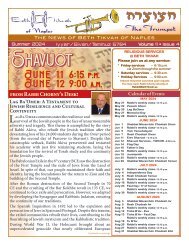You also want an ePaper? Increase the reach of your titles
YUMPU automatically turns print PDFs into web optimized ePapers that Google loves.
Welcome • ohtcv ohfurc<br />
Shabbat Shalom • ouka ,ca<br />
Shabbat Parshat Becukotai<br />
24 Iyyar 5784 • June 1, 2024<br />
h`eujc<br />
SHAVUOT<br />
JOIN US FOR SERVICES<br />
11 TH<br />
12 TH<br />
JUNE<br />
11<br />
JUNE<br />
12<br />
TH - 6:15 P.M.<br />
TH - 9:00 A.M.
Yahrtzeiten<br />
Anniversaries<br />
May 31 Beth & Albert Blumberg (43)<br />
June 3 Gayle & Steven Chizzik (51)<br />
June 7 Lee & Joe Henson (55)<br />
vfrck oburfz<br />
June 1 • 24 Iyyar Rubin Levin – Father of Samuel Levin<br />
Simon Cherkasky – Father of Belle Agronin<br />
June 2 • 25 Iyyar Anne Goldfine – Mother of Mel Goldfine<br />
and Elaine Kamin<br />
Joyce Tanenbaum – Sister of Gayle Levy<br />
June 5 • 28 Iyyar Max B. Green – Father of Judith Chaloff<br />
June 6 • 29 Iyyar Harry Myers – Father of Marian Engel<br />
Neil W. Randall – Son of Libby & Leroy Randall<br />
Harry J. Dunn – Father of Norma Rosen<br />
Al Pavlo<br />
– Father of Francine Kaufman<br />
Elaine Weinstein – Wife of Barton Weinstein<br />
June 7 • 1 Sivan Martin Weiss – Father of Judy Fant<br />
Simon Mest – Brother of Stuart Mest<br />
Victor Rosenberg – Father of Alan Rosenberg<br />
Ira Schwartz – Brother of Elliot Schwartz<br />
Birthdays<br />
jna `skuv ouh<br />
June 1 David Siegel June 2 Ruth Jason<br />
June 3 Debra Silow, Susan Schwartz<br />
June 4 Howard Gilbert June 7 Nancy Garfinkel<br />
Shabbat Kiddush Sponsored by:<br />
Ed & Paulette Margulies<br />
In honor of Rabbi Chorny and<br />
the Beth Tikvah congregation<br />
Mavens: Steve Chizzik & Fran Kaufman<br />
Assisted by: Elaine Kamin, Mel Goldfine,<br />
Isabel Ramos, Shep & Linda Scheinberg<br />
Sponsor a<br />
Kiddush<br />
cuy kzn<br />
Contact Arleen Sivakoff:<br />
dsivakoff@aol.com • 239.455.8811
Torah & Haftarah Readings:<br />
Shabbat <strong>Bechukotai</strong>: Leviticus 26:3–27:15 (Cycle 2) (Etz Hayim p. 746)<br />
1. 26:3-5 2. 26:6-9 3. 6:10-46 4. 27:1-4<br />
5. 27:5-8 6. 27:9-11 7. 27:12-15 M. 27:32-34 (p. 756)<br />
Haftarah: Jeremiah 16:19–17:14 (p. 763)<br />
Torah Commentary<br />
D’var Torah:<br />
Joseph’s Hidden Blessings - Bex Stern-Rosenblatt<br />
Joseph is a man whose dreams come true. Joseph is a man who can reshape<br />
reality to correspond to his will. Joseph is a man who saves multiple nations.<br />
But I wouldn’t want to be Joseph. I wouldn’t want to go through what he<br />
has had to go through to get where he is. And even at his peak, at his most<br />
successful, I would not trade places with him. He is feared and revered,<br />
untouchable and apart. Even when his family returns to him, he never quite<br />
returns to the bosom of his family. He is a man apart, a troubled lad who<br />
becomes a lonely administrator. He is not my idea of blessed.<br />
And yet, his story hides behind the blessings in our parashah. We find it first<br />
in the phrasing of Lev. 26:6, “And I shall set peace in the land, and you<br />
will lie down with none to make him tremble, and I shall make evil<br />
beasts cease from the land, and no sword will pass through your<br />
land.” The term “evil beasts,” vgr vhj appears in two cases in the Torah - in<br />
our parashah and in the story of how Joseph was killed which his brothers<br />
conspire to tell his father and which his father imagines into being for his<br />
brothers. It’s a horrifying story. It’s a story of lying brothers and a complicit<br />
father. It’s a story of near murder. It’s a tragedy that breaks Jacob’s heart.<br />
What’s more, it’s a story about evil beasts who do not actually exist. There are<br />
no animals who tore up Joseph. Joseph is still alive. The very idea of an evil<br />
animal is hard to understand. Humans can do good and bad. Animals, even<br />
animals who kill humans, are surely not acting maliciously. In the curses<br />
section of our parashah, we find animals, this time animals of the field or<br />
wild spaces, who will cause bereavement by killing domestic animals and<br />
humans. But those animals are not classified as evil. They are simply acting<br />
according to their nature.<br />
When God tells us, as a blessing, that he will make evil beasts cease from the<br />
land, it is almost a threat. Hidden in the blessing is an acknowledgement of<br />
how much worse the situation could be. There are currently no evil animals<br />
planning on killing us. But imagine if there were. Being blessed, in this sense,<br />
is a realization of the fragility of our situation and an appreciation that it<br />
could be worse. Being blessed, in this case, is Joseph lucky to be alive, even as<br />
a slave sold and on the way to Egypt.
The Joseph story haunts the rest of our parashah. We count our blessings<br />
and fear curses largely based on whether there will be food to eat. Joseph’s<br />
coup de grace for Egypt was finding a way to store food from year to year,<br />
to have abundance even in a time of curses, of famine. In the context of last<br />
week’s parashah, God provides us with food when we let the land lie fallow<br />
for Shmita and the Jubilee Year. In the context of the Joseph story, Joseph<br />
provides us food whe the land cannot be made fruitful. God’s blessing that<br />
we shall “eat the long-stored supply and you shall take out the long-stored in<br />
favor of the new,” promises that after Joseph and after a Shmita year, we will<br />
still survive and thrive. Rather than God taking us out of Egypt, it is us who<br />
will be taking out food. We all become little Josephs, managing our<br />
Joseph and his brothers do not seem blessed. They are the ones who<br />
started our descent to Egypt. They are the ones who acted as evil animals,<br />
condemning their own brother. None of them really lives happily ever after.<br />
Their father’s final remarks to them can hardly be called blessings.<br />
And yet we choose to bless our children that they be like Joseph’s children,<br />
like Ephraim and Mannaseh. God chooses to present the ideal world, the<br />
best of the best, to us with the tragedy of the Joseph story hiding behind it.<br />
Perhaps, we are invited to believe that we are blessed even when life seems<br />
cursed. Perhaps we are reminded that, like Joseph, we can transform years of<br />
scarcity into years of plenty. Perhaps, we can hold out hope that our children<br />
will be like Ephraim and Mannaseh even when we are like Reuben and<br />
Simon.<br />
✺ Join Rabbi Chorny<br />
for his weekly discussion<br />
group, Tuesdays at<br />
12:15 p.m. via<br />
and IN Person<br />
Beth Tikvah of Naples<br />
1459 Pine Ridge Road<br />
Naples, FL 34109<br />
239 434-1818<br />
Visit us online at<br />
bethtikvahnaples.org<br />
or scan the QR code

















